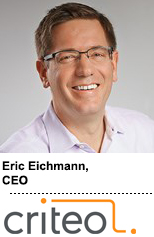Following a brutal 2015 for publicly traded ad platform companies (at least those not named Facebook or Alphabet), the first month of 2016 was, well, not much better.
That is until Wednesday, when Criteo reported Q4 revenue growth of 55%, to $407 million (362 million euros). Additionally, the company crossed two symbolic milestones, hitting $1 billion in revenue for the year and surpassing 10,000 clients. Earnings release.
As a result, Criteo’s stock reversed a months-long slide, climbing from $26.04 at the close of trading on Tuesday to over $35 by Wednesday afternoon.
Company CEO Eric Eichmann, who took the helm when founder and longtime CEO JB Rudelle stepped into the chairman role in December, said guidance for 2016 sets revenue growth expectations between 30% and 34%.
The growth is striking for a firm in a category in which many competitors have been acquired. Sociomantic, TellApart, Chango, Fetchback and Triggit have all chosen private exits, some happily and others less so.
Speaking with investors, management described three current or potential revenue growth engines for the company: its cross-device graph, prospects for growth in Asian markets (most notably China) and consumer adoption of mobile commerce.
Eichmann said that as a company whose revenue is tied very closely to the end conversion (meaning Criteo gets paid when the merchant gets paid, not on clicks or other metrics of less tangible brand value), a cross-device graph provides several benefits.
“There’s still not an easy way to demonstrate attribution across devices,” he said.
An example of these measurement challenges might be a mobile ad leading to a desktop conversion (where American users in particular are still more likely to make purchases). Criteo can close that gap by combining its own device graph with hashed identifiers provided by clients.
Cross-device also opens up more inventory opportunities as Criteo identifies users on more devices and wins a greater number of impression auctions as a result. This in turn should lead to a lift in conversions.
Across all global business, mobile accounted for 47% of Criteo’s revenue in 2015. A year ago the company didn’t even unbundle mobile vs. desktop conversions in overall revenue.
“We track closely to ecommerce,” said Criteo CFO Benoît Fouilland, so expect mobile to account for an increasingly large share of the company’s revenue moving forward.
China is a unique challenge. Relationships with programmatic partners, RTB platforms and publishers in China must be developed from the ground up. Valuable partnerships with Facebook or Google, for instance, do little for Criteo in China considering how boxed out those big platforms are in the country.
“The plumbing and pipes we have to set up are completely different,” Eichmann said.












